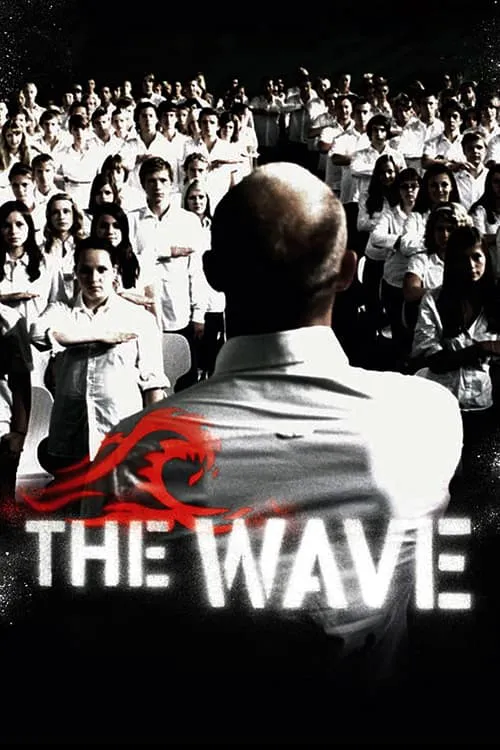The Wave

Plot
Benjamin Mertens, a Norwegian school teacher, had been leading a discussion with his high school class about different types of governments. However, during the session, his students displayed a distinct lack of interest in the subject, particularly when it came to national socialism. As their teacher continued to delve into the intricacies of such governmental systems, the students grew increasingly restless. It wasn't long before the topic became too monotonous, and their thoughts turned to more relatable and exciting subjects, such as the latest music trends or sports. One student named Rolf quickly chimed in with the notion that dictatorship, a key component of national socialism, was impossible to establish in modern-day Germany. The class generally agreed with Rolf's assessment, dismissing the idea as an outdated concept that had been abandoned in the aftermath of Adolf Hitler's tyrannical regime. Despite this, Mertens continued to emphasize the importance of national socialism, and its ability to gain traction in any society. Intrigued by his class's skepticism, Mertens embarked on an experiment to show his students just how easily the masses could become manipulated. He presented an idea that would challenge their perception of reality and demonstrate the potential for a modern-day German society to succumb to a fascist regime. The proposal was simple yet ambitious: he wanted to establish a miniature version of the Nazi Party within the school itself. Mertens' experiment would take the form of an organization called the "Patriots of Germany." He would use this group to manipulate and influence the actions of his students, demonstrating the techniques that Hitler and his Nazi Party had employed to gain control over Germany during World War II. In the initial stages of the experiment, Rolf, who had voiced his skepticism towards dictatorship earlier, became an unlikely participant. Mertens skillfully exploited Rolf's insecurities and sense of belonging, convincing him to help spread the Patriots' ideology within the school. As the group's momentum grew, more students began to join Mertens' organization. He skillfully played on their emotions and anxieties, preying on their desires for security, belonging, and structure. As the Patriots of Germany expanded, it became apparent that the group's activities were starting to take on a life of their own. Mertens found himself increasingly powerless to control the direction that the group had taken. His initial intentions of demonstrating the dangers of manipulation and dictatorship had evolved into something more sinister. Throughout the experiment, Mertens struggled to maintain a sense of balance between his role as a teacher and the leader of the Patriots. The lines between reality and fiction were continually blurred as the group's influence began to spread beyond the school walls. Mertens' experiment had inadvertently tapped into a deeper societal concern: the fragility of democratic systems. As the group gained traction, it began to resemble a microcosm of what could happen in any given society if the foundations of democracy were eroded. Despite his original intentions to demonstrate the dangers of manipulation, Mertens found himself caught up in the very machinery he had created. The students of the Patriots of Germany began to exhibit increasingly fervent and extreme behavior, much to the concern of their parents and other teachers. They were beginning to mirror the actions of their predecessors, the Nazi youth of the 1930s, as they became increasingly radicalized. It appeared that Mertens' experiment had become self-sustaining, with the students feeding off each other's energy as they rapidly descended into extremism. One fateful day, Mertens realized the gravity of the situation and made an attempt to intervene. However, it was too late. The Patriots of Germany had become an unstoppable force, fueled by the enthusiasm of its members. Rolf, who had initially been so skeptical of dictatorship, had evolved into a leading figure within the group. He and his comrades began to push the boundaries of acceptable behavior, disregarding the rules and conventions that had been placed upon them. In the climactic final confrontation, Mertens struggled to bring the group under control. His intervention, unfortunately, came too late, serving only to highlight the gravity of the situation. The experiment had spiraled out of control, illustrating the insidious nature of manipulation and the ease with which a group of individuals can be coaxed into extreme and violent behavior. As the dust settled, Mertens realized that his experiment had produced a profound and disturbing result: the students, once so full of confidence in their ability to distinguish good from evil, had now become pawns in a game of mass hysteria. The Patriots of Germany had brought their school to a grinding halt, exemplifying the dark and potentially catastrophic consequences of unchecked power and manipulation. In the aftermath of the experiment, Mertens and his students were left to ponder the lessons they had learned. They had discovered that the seeds of dictatorship and the erosion of democracy can be sown in even the most mundane of settings. It was a sobering revelation, one that served as a warning to those who believed that such dark phenomena can never happen again. The legacy of the Patriots of Germany would serve as a haunting reminder of the fragility of modern society and the potential for chaos and destruction when individual freedoms are ignored.
Reviews
Recommendations




